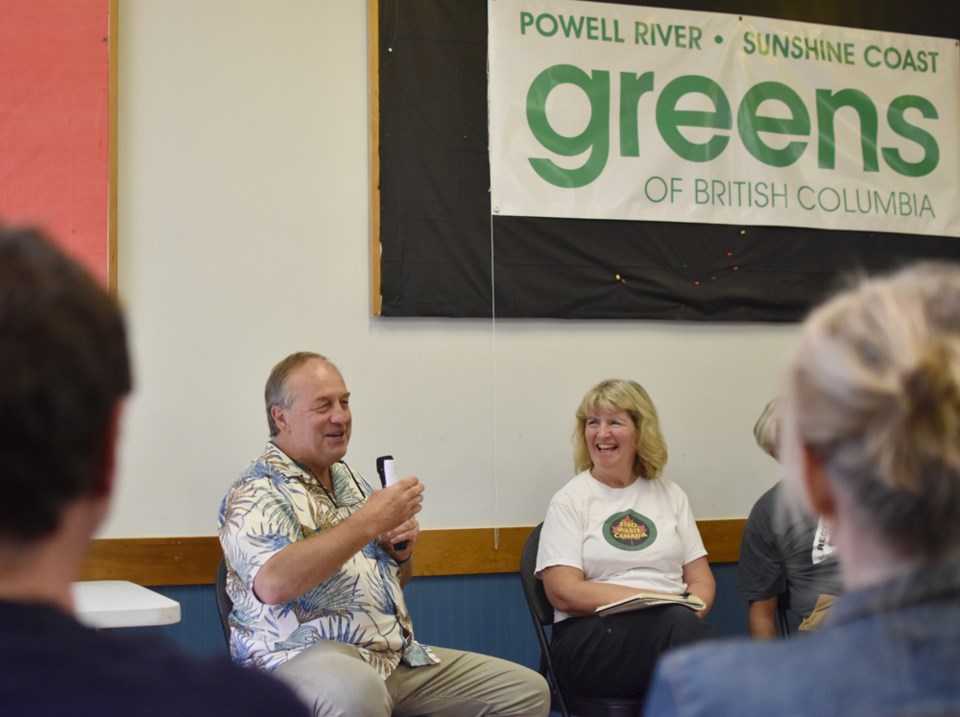BC Green leader Andrew Weaver and Green MLA for Cowichan Valley Sonia Furstenau visited the Lower Sunshine Coast to hear from constituents on a “listening tour” while the Legislative Assembly breaks for the summer.
“As legislators we’re trying to learn about the relevant issues affecting our various portfolios,” Weaver told Coast Reporter on Aug. 16.
At the tail end of the tour on Saturday, Weaver said housing affordability “was the number one issue brought to our attention,” in addition to the Sunshine Coast’s water crisis, and the unresolved sinkhole problem in the Seawatch neighbourhood in Sechelt.
“I’ve got a couple of things I’m going to raise at the next caucus meeting about questions we can bring towards government,” said Weaver. One of those specific things was the difficulty of reserving ferries on the route between Langdale and Horseshoe Bay, which Weaver plans to raise with their transportation critic Adam Olsen.
“I know trying to book a ferry here you simply can’t. Weeks in advance they’re all booked up, but there clearly is demand for more service,” said Weaver, adding, “This particular route is a money-maker for BC Ferries, so surely money makers should make more money, and we’ll be asking questions about why the second ferry that exists is not always in use, why there’s not hourly sailings.”
The Lower Sunshine Coast tour lasted from Aug. 16 to 17 and included meetings with municipal governments and the Sunshine Coast Regional District (SCRD), visits to the Sechelt Water Resource Centre, Northern Divine fish farm and Salish Soils. Two public talks also occurred.
About 70 people attended one of those talks – a Saturday morning session at Kinsmen Hall in Gibsons that focused on waste and recycling. Panelists included Zero Waste Canada board directors Buddy Boyd and Barb Hetherington, and Salish Soils’ John Sutherland.
During the talk, Hetherington said she is working with the federal Green Party on their zero waste policies. “They contacted me and I hope that the provincial Green Party will also talk to me about that.”
Boyd, meanwhile, pushed for opt-out programs for organics waste pickup on the Sunshine Coast, and said local governments should focus on rewarding good behaviour rather than enforcement. “It just keeps building bureaucracy, so the money we pay as taxes isn’t actually going to reducing our waste levels.” He said the SCRD’s solid waste management plan committee should focus on education. “That would be the greatest thing we could possibly do as we design our policies,” he said.
The panel also touched on plastics bans, which the Town of Gibsons is considering.
Weaver brought up recent efforts by the City of Victoria to ban single-use plastic bags and the court ruling that overturned that ban. “Hopefully some regulation at the provincial level will allow local governments to do what Victoria has done and do so without fear [of legal action],” he said, while also encouraging the public to “call government out on some of the directions.”
“You can’t on the one hand start saying that we’re going to introduce a policy in the province of B.C. to deal with single-use plastics and in the same breath say, ‘Oh, and by the way we’re going to build a massive facility to create single-use plastics.’ That’s literally what’s going on in the province of B.C.,” said Weaver.
In July, a Calgary-based company announced it had purchased land in Prince George to build a petrochemical facility to manufacture plastics for markets in Asia. That month the province launched an online survey to get input on reducing and phasing out single-use plastics.



